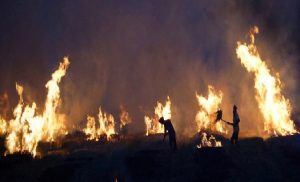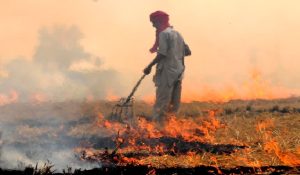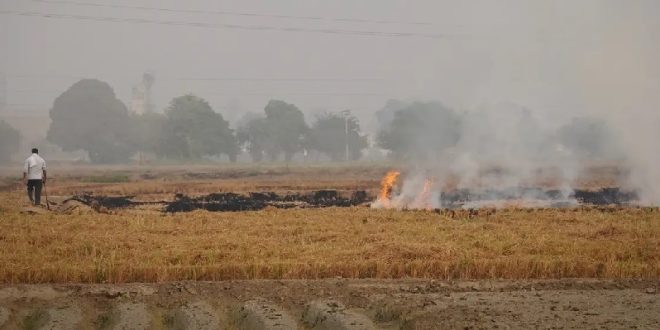21-11-2024
NEW DELHI/ MANSA: Swaran Singh is among a handful of farmers in Bhikhi village in India’s northern state of Punjab who, instead of burning his crop waste this year, has invested in a tractor and equipment to collect it for removal by a private contractor.
The paddy waste, or stubble left after harvesting, has been chopped and stacked in a corner of his farm for four or five days, he says, waiting for the contractor to dispose of it but time is running out, with sowing due again.
 “I will wait for a few days and if no one comes to clear it, then I will set it on fire,” said Singh. “I cannot wait further as I have to sow seeds to cultivate the next crop.”
“I will wait for a few days and if no one comes to clear it, then I will set it on fire,” said Singh. “I cannot wait further as I have to sow seeds to cultivate the next crop.”
Crop residue fires set by farmers like Singh in Punjab, India’s breadbasket state, are illegal and blamed every year for blanketing northern India and neighboring Pakistan with a toxic smog made up of smoke, construction dust and vehicle emissions.
Air quality has deteriorated this year too, with the start of the harvest season and farm fires in late September, contributing to a public health crisis.
The air quality index (AQI) in capital Delhi touched a peak of 494 on a scale of 500 on Monday, forcing authorities to restrict vehicle movement and construction activities, and order schools to conduct classes online.
Punjab reported the highest number of fires on a single day this season on Monday at 1,251, state authorities said.
India defines an AQI reading of 0-50 as “good” and above 401 as “severe”, which is a risk to healthy people and “seriously impacts” those with diseases.
Farmers in Punjab and neighboring Haryana and Uttar Pradesh states say they have a small window to clear the earth between the paddy harvest and sowing the winter wheat crop. Efforts to persuade them to use machines to chop the stubble or chemicals to dissolve them have failed due to the high costs involved with the machinery, and low success rate of the chemicals.
Penalties and subsidies have converted some farmers, but not enough to reduce pollution levels, experts say.
Reuters spoke to eight farmers in Punjab’s Mansa district, all of whom were ignoring warnings and burning stubble.
 Makkhan Singh, a contractor who picks up waste, said the government was not tough enough on the farmers.
Makkhan Singh, a contractor who picks up waste, said the government was not tough enough on the farmers.
“By the time we reach the farms, farmers have already set the stubble on fire,” he said. Mansa’s administrator Kala Ram Kansal said they had fined at least 150 violators of crop-burning laws this year.
The Punjab chief minister’s office did not respond to questions on the problem but state officials told local media that the fires had reduced this year.
Farmer Sukhdev Singh said it was unfair to blame farmers for the poor air.
“Yes, we continue to burn stubble but the government should realize that we are the closest to the fires, we get headaches, we also have breathing problems,” Sukhdev Singh said as he and his relatives set fire to waste. “We don’t do this for fun.”
Farmers destroy their harvest out of frustration as the prices dropped. The farmer is already frustrated because his sweat on the soil didn’t bring fruit .All his efforts did go waste. Is it good to arrest such frustrated and heavily losing farmers? No, not at all.
The problem then lies only with the regulator, the appropriate government. An individual farmer can’t come down with his produce from Punjab to Tamil Nadu for selling it for higher price. The reverse is same when a fair price isn’t available locally. Since there are no takers for a fair and reasonable price, farmers lose their heart and out of frustration they destroy their produce. We have witnessed many times farmers destroying vegetables,milk, etc., mostly perishable items.
 Pressmediaofindia
Pressmediaofindia




